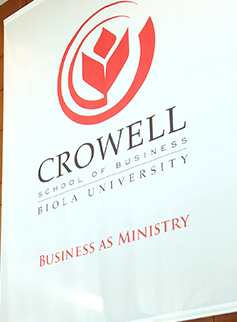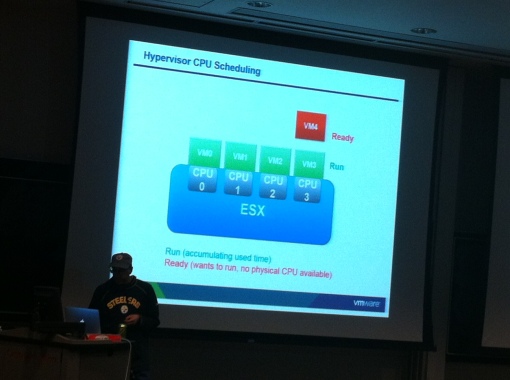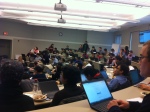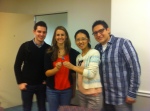You can follow our married adventures at AdventuresoftheC.wordpress.com
Practice. And then climb over the walls.
23 08 2014The other night at dinner some friends and Brian and I were talking about how high school is such a good time to learn and perfect new skills. You want to learn how to play guitar? You can come home and practice after school for hours. Want to plant a garden? You get the seeds, do all the research, and then tend to your plants. Once you get older you have too many other responsibilities to do and you fail to make the time to learn many new skills (that aren’t required for your job).
However, isn’t this a poor way to look at life? We give up pursuing the things that are interesting to us (and when you pursue things with deliberation, you generally get better at them!) just to “exist”. So many families are busy these days chasing after the American dream. (PS. side note – stop watching TV! It will give you hours of your life back to do and try new things).
I want to be a skilled person. I want to invest in myself, providing time to learn new things every year. Sure, that will look differently as family life changes, but I think it’s important to look at life through the eyes of kids.
Today we went to a summer picnic sponsored by Brian’s work. It was at Yolo Land and Cattle Co. Ranch, out in the countryside. We had a cow pie throwing competition. It was funny to see the adults all squeamish — the cow pies were dried! It wasn’t like it was really that gross. Most of them were hesitant to participate. The kids, on the other hand, were excited to participate in the competition! The one little boy was playing in the dirt, exploring the ranch with all he had. And then the adults were huddled under the shade drinking their beers. The little kid was probably the one learning more. He was kicking the dirt, seeing how far he could make it go. The other kids were experimenting with which size cow pie would go the farthest. I heard one older man (after participating in the contest) say that he couldn’t wait to wash his hands, because that was just so gross. It was funny to me, in contrast to the kids, who didn’t really think anything of it. They thought it was fun. It was an adventure. The old man went back to his comfortable shady position after washing his hands in the bathroom.
At what point in life did we as adults lose our sense of adventure? I know many kids think that adults are “boring”. Yeah, kid, I think so too.

Get your hands messy!
While we were driving up to the ranch, Brian and I had an interesting conversation about practice, specifically regarding how PE in school teaches kids new skills and makes them do things at which they’re not necessarily good. I (only-half-) jokingly said that they needed to have PE in companies, where everyone would need to take a break from work and learn a new sport that week. I feel like most people would hate that! “I’m not good at sports”; “I don’t know how to play”. So. Who cares? That’s the point. You have to practice in order to get good at things. If you haven’t ever tried yoga, how do you know you won’t be good at it. “I did it once. It was hard and not fun.” OMG. Seriously, I’ve heard people say these things. Look, did you try riding a bike once and tell your mom “I tried it. I fell off and it hurt. I am not good at it.”?! No! You go back up and tried 300 times more before you did it! These days it seems like people hit a wall and they stop. Climb over it! Don’t you see that if you took a ladder, with lots of little steps, there would be a way to scale the wall and stand on the top, conquering it? And how accomplished you would feel! How much adventure you could add to your life if you’d only get out of your comfort zone of doing things in which you’re already accomplished.

At what point did we lose our intrinsic motivation to get better? Or maybe you never had it in the first place. Maybe you only practiced piano because your mom set the timer. But you still got better at piano, right? Because you had to practice. Maybe you need to set the timer for yourself and don’t get up until you finish practicing your writing, or your new instrument, or your knitting. I bet if you spent 30 minutes each day practicing a new skill, talking with new people, or trying new recipes, you’d find that you got better. You might even uncover a new hobby that you really, really like.
So, with the end of summer approaching, and school starting back up (not for me! but off to start work!), kids are getting back to go practice. As an adult, what are you going to practice and try?

Be a kid and jump! Take a risk. And when you fall down, get back up and do it again.
I have tried cooking a lot of new recipes. A few have really flopped and won’t be made again; we’ve found a few new ones that we really like. But, I totally failed in canning the other night. Ugh. But you know what, you try again. This time, I need to get the right tools – a pressure canning pot! You fall down and get back up again. You can see some of our new favorite recipes here on Pinterest. Yes, I’ve made almost all of those the past month! Crazy!
Leave me a comment and let me know what you’re going to try!
Comments : Leave a Comment »
Tags: Motivation
Categories : Uncategorized
Our Wedding Highlights Video
2 08 2014Want a sneak peak into some of our wedding highlights?
Pictures to come soon!
Comments : Leave a Comment »
Categories : Uncategorized
Leadership Development Journey while at Tepper
4 04 2014
I had to give a presentation about what I’ve learned about leadership and how I’ve grown as a leader throughout my time at Tepper. I chose to mainly talk about being president of the Business & Technology club, as that was my main expression of leadership while I’ve been here.
If you’re interested in hearing about my journey, check out the video!
Comments : 1 Comment »
Tags: B&T, Tepper School of Business
Categories : Uncategorized
B&T Website & Board Photos
3 04 2014In case you never saw our B&T Club website, you should take a look at it (before our 2013-2014 board pictures are taken down).
I probably should have posted this LAST year once we got it up and running, but I just realized that I never shared it with most of you, so figured I’d provide the link!
Comments : Leave a Comment »
Tags: B&T, Tepper School of Business
Categories : Uncategorized
Corporate Social Responsibility & Business’ Importance in Changing the World
29 03 2014I’m taking a class called Operations Strategy this mini. I’ve already learned so much in just the first two weeks. I really like the professor, as he started off the first class with very compelling reasons on why ops strategy is important. He talked about how a good business without good operations behind it won’t succeed, and how a supply chain can get a company into a lot of trouble. Consider Apple’s issue with Foxconn a few years ago. How do you, as a huge company that’s concerned with selling iPhones in perfectly-branded Apple retail stores, ensure that your manufacturers are doing what they’re supposed to do? And who sets that standard of “supposed to do”? There are many countries where child labor is expected and accepted. Who sets the standard of what age is too young to work?
In America, we have a privileged view. We think that we can send our items overseas to be manufactured and let the social issues, environmental issues, and other problems be carried out there, and then receive the product back here in the US without even thinking about what has happened to get us our product. (Guilty as charged — I generally don’t care, or even think to care, about how my product reached me. I just know that it was cheap and I needed it).
In Operations Strategy we talked about an IKEA case where child labor was occurring; because of the hype that was brought up about it, IKEA needed to do something to reduce the PR concerns. However, is solving this problem for the sake of a PR issue (because some people don’t like kids working) actually helping? Or are they just doing it to make more money, because they look better for not having caused social problems? I really liked the way that IKEA approached the issue. At first, I didn’t have an issue with children working; I mean, I’d rather have them work than starve to death. And if my company doesn’t put them to work, there are plenty of other companies that will give them work — that’s business right? Economics? When there’s a desire, it will be filled by someone wanting to make money/get cheap labor. So why not have it be your company, where you could profit from it and then send the money back to help create schools or something for the country? (Yes, remember privileged white girl viewpoint.) Anyways, but IKEA decided that rather than just doing it for the sake of PR and removing themselves from having child labor (an almost impossible task when your business strategy is low-cost goods, and you use developing countries to keep prices low) was to actually impact the community around them. They started working with their manufacturers to learn why kids were working in the factories. What was the root cause? And after finding some issues, they decided to build a school at the factory (I hope I am remembering correctly from our class discussion…). So maybe you can’t totally eliminate child labor in a country such as this; but you can help still educate the children, which will in the long-term reduce low wages and child labor. Child labor reduces adult wages, because the market is more saturated with workers. I didn’t really think about how this just contributes to a cyclical way that the society works. Why not step in and try to change it? Sure, you might fail, but you might help some people while you’re at it.
What I’ve learned this past week is that businesses can be valuable initiators of change in the world. I probably should have known this before, but it really hit me this week. Many people think that only non-profits can do this. Although there are some good non-profits doing well, a majority of non-profits fail because donors decrease during downtimes, there is less accountability, and if you’re doing something because you’re interested in it, that doesn’t necessarily mean that other people want it or that it makes good sense to do it the way that you’re doing it. This is the reason that free-trade markets and the way that the US economy works so well; you have people who want something, and someone else who is willing to provide it. At a certain point, they will find a price that is beneficial for both parties. If the price is too low for the seller, they will hold out for someone else to purchase it at a higher price — if that is not an option, they will recognize that the originally buyer was the best price and sell it.


I went to Biola University and studied Business Administration at the Crowell School of Business. One of the big ideas that we learned was to use “Business as Ministry”: To have businesses that impact the world as missions. God has called some people to be linguists and be missionaries. God has called some people to use their business as their mission field. We each have different skills, and Biola tried enlighten people that they could use their specific talents to impact the world for the Lord in their specific field — ours: business. The goal is not to use business as an “undercover business” while you’re doing missions work; it’s to use business to bring about change in the world, to use business to spread the Gospel. So why did it just hit me now? I guess I’ve still been in the camp of people who don’t really think that I can change the world. How can I extinguish child labor from not happening (and do I really think that it’s important to do so?)? Really? I don’t think THAT highly of myself and my capabilities. Yet, at the same time, if God gave me a position to do that, I don’t know if I would! But, why not? There are some companies, like Nike, that are out there working to improve the way that they reduce waste, reduce the hazardous chemicals they use in products, and give fair wages. If you’re a good business, you will still have to figure out how to do this and make a profit (unlike non-profits). As a huge player in the field, Nike can provide leverage to get other companies to change their manufacturing practices. So if I was someone working at a company like this, I would be able to help possibly get the world to change.

Something else that got me thinking about privilege was the Unicef water project. “Millions of children lack clean water. How long can you go without something far less vital….your phone?” is their home page for the month of March. Giorgio Armani Fragrances and others have partnered with Unicef to donate one day of clean water for a child in need for every 10 minutes that you don’t touch your phone. It’s actually pretty cool technology, as they use your gyroscope to determine if you pick up the phone or use the screen to determine your “lack of use”. A great way to make people aware of what is happening in those 10 minutes of “need”. Can you imagine having to fetch water? Most of the people who spend all day getting water are young women. I’m so grateful that this wasn’t my job in my family growing up. They don’t get to go to school because of their taxing job requirements. But not playing with your phone is hard for us! I mean, it doesn’t compare to their “hard” but it’s not easy, when it’s a tool you’re used to using all day. Pretty cool project for a company to sponsor to get people aware of the issue, and actually to provide help to those without water.
Sometimes I think changing the world takes huge steps. It seems like giant changes are required. I am just one person. How can I do it? However, the beauty of community, the beauty of being an American, the beauty of all the privileges that I’ve been given, including wealth, education, and a job where I actually will be working at a company that influences and touches the lives of a majority of the world, means that I might be able to do something. Well, I can do something, if I’m willing to do so. It will not be easy. But I can use the skills I’ve been given to make this world better. To not exploit people, just because “that’s the way that it’s always been done”. What if it was your kid? What if it was your water supply that was getting polluted producing products for Americans? I’ve never been the “green” person, although I recycle pretty fastidiously and always try to conserve water, because I’m from SoCal and that’s what you do. And I’m marrying an environmental engineer who went to Berkeley; okay, so maybe I ended up becoming more “environmental” than I thought 😉
But anyways, I’ve been given a position in which I can do something about it; maybe not necessarily today, but in the way that I support purchases, I guess I could. It’s hard because we’re so removed from what’s going on. The only effect that I can think is that it “harms” me: it costs more oftentimes to buy responsibly. Think of the way that you can make a difference by having a good business. You can actually help the world in ways that you might have never thought possible. The impact can be large with such a large entity choosing to do good.
Comments : Leave a Comment »
Tags: Tepper School of Business
Categories : Uncategorized
Tepper CIO Panel
23 03 2014I wrote this up at the end of last mini, but realized I never posted it. Here’s a recap of a great event we did in Mini 3.
“The “I” in IT doesn’t just stand for information anymore, but it now also stands for innovation.” – CIO Panelist
Tepper, sponsored by the Business and Technology Club, hosted its first-ever CIO panel discussion last week. This was an event that I have wanted to do all year. Actually, I think before I became president of B&T, this was an idea that I hoped to bring to fruition. Much of my time at Tepper has been spent explaining to business people why I, an MBA student, am going into IT Management. On the other side, the IT people have been asking the question “why would someone who wants to do tech leadership get an MBA?”. I have tried to help Tepper understand the value that an MBA provides to people going into IT. And I’ve tried to help IT departments understand the benefits that someone with an MBA can bring to their organization.
I’ve wondered where the CIOs are going to come from in the future. You generally run into the problem of CIOs who aren’t respected by the “lower ranks” because they aren’t tech people and they really don’t understand the technology required to get their business ideas to work. Or, you have tech people who have moved up to be CIOs and generally don’t understand the full picture of business. My proposition to help solve this quandary is to ensure that we are bringing in people with technical backgrounds, training them in business so that they gain a full spectrum of knowledge about a company, and then ensuring that they are able to translate technical requirements into business value and business needs into technical specs. This seems like a HUGE value proposition that Tepper could provide, since they are the number one business school for an Information Systems concentration, and it is Carnegie Mellon. Where else should future CIOs be coming from besides Carnegie Mellon’s Tepper School of Business?
To further this proposal, the B&T Club was determined to host a CIO speaker series. However, instead of just bringing in one CIO, we were able to bring in 3! An event like this is very difficult to execute, since CIOs are very busy people and having a Friday afternoon session interrupts their work schedule.
We were very honored to have three wonderful panelists: Mark from Armada Logistics, Marc Brown CIO of Polyconcept (previous CIO at Del Monte Foods and Heinz), and Jody Cervanek, a prior CIO at UPMC Medical and a current Consultant to CIOs in the Healthcare sector. The topic of discussion was surrounding the role that MBA students should play in the IT organization (not necessarily IT companies, but the IT org internal to the company). The panel conversation was moderated by Tepper’s Professor Ravi, who did an excellent job.
One of the main things that I took away was the importance of the CIO to understand their area, but also the full needs of the business. Did you know that one of the reasons Mom and Pop pizza stores are dying is because of their lack of technology? 40% of pizza sales are ordered online. If you don’t have the underlying technology to support your business, your business will fail. In light of this, CIOs need to be a collaborator with other executives and ensure that they set up a good governance structure of IT so that it furthers business value. It’s important for CIOs to understand the operations of the company well, because IT is more frequently being used to help reduce costs of operation. In order to provide services that reduce costs, it’s critical for tech executives to understand what they’re actually supporting. Also, as the term “big data” and analytics become more popular, it’s important for CIOs and their organizations to allow “average” users to create reports based on data. In the past, there have been report writers within IT. But with the changing landscape, the marketing and sales teams need real-time data; the operations team needs supply chain information. They don’t want to have to call IT every time they need a new report. IT should be enabling its users by making it easy for users to build and create their own real-time data reports (I know, it sounds way easier than it is technical possible!). If this doesn’t occur, the company will start to have skunkworks report writers pop up in each department. They need their data one way or another!
Another thing that was discussed was the “requirements” for IT Leadership positions (and how to get hired into this area!):
- Passion
- Team Builder: Connection and good conversations with the recruiter
- Visionary: A good picture of where to take the future
- Translator: The ability to listen carefully and translate your learning to things that everyone can understand
- Active: Does your cover letter (and what you say you’re passionate about) actually acted out on your résumé?
- Knowledgable: An ability to understand and ask questions about industries even if you weren’t familiar with them
- Adaptable & Quick Learner: Someone who can play in a dynamic changing market
- Skilled & Diversity: A breath of “tools” and perspectives
- I really enjoyed the session and I think the CIOs even had a fun time interacting with the students. I wished that we could have talked all afternoon. I hope that conversations like this can continue at Tepper. I know that I will follow up with these amazing people in the future, and look forward to interacting with them again.
Special thanks to Silvio Tannert and Alexa Hansen for executing a flawless event.
Comments : Leave a Comment »
Tags: Business and Technology Club, IT, Tepper School of Business
Categories : Uncategorized
The days grow longer: literally and figuratively
4 02 2014
Every once and awhile the sun comes out. Just to remind me that it exists, but generally resides in California.
I remember telling one of my B-school friends that even though my days are still about as long as they were when I was a first year student, they don’t seem to be so bad anymore. I mean, they’re still long. But it just seems like that’s life. (Oye — 14 hour days = normal….)
I think one of the things that has helped contribute to me getting more used to these long days is the value that I receive from them. Leading B&T has made my days very long, but also very rewarding. The days when I hear that many of our first year members received offers from large tech companies such as Cisco makes me feel like we’ve done our job well. There’s joy found in serving those in our community, in helping them achieve their goals — goals that some of them weren’t sure they could attain.
Unfortunately there are days when it’s too “business-y” for me (like having a company pitch competition — cool, but nothing I’ve ever wanted to do) and less techie, but I’m in B-school; I guess that’s expected. To make up for days like that where I’m working on commercializing a product, I have to take a little break to go to a “tech talk” session in the CS department. I have to say, I’m such a nerd. I really just love servers. Hearing the speaker from VMware talk about how to debug and optimize your virtual servers just does something to my heart (don’t worry, Brian — nothing like what you do to it ;)). But actually, I’m really grateful that I’m at CMU where I can learn about tech and business from great teachers, presenters, and students.
Much to my dismay, the groundhog (who only lives like 2 hours away from here!) saw his shadow, so we’ll have a few more weeks of winter, but I’ll be home to warm San Diego in less than a month! I’ve never seen snow like we had last week. It just piled up.
Until I can next see the sun in San Diego, I’m sure the days will continue to grow longer as we finish up the mini. However, as the days grow longer, the more I will have to cherish the decreasing days of being here at Tepper. I’m trying to take advantage of the time left to explore Pittsburgh more. Michelle, Sang, and I went to visit the Incline, up to the top of the huge hill, which overlooks the city of Pittsburgh below.
And of course, there are always wonderful packages that come in the mail from my fantastic fiancé to remind me that there are flowers in other parts of the country.
Comments : Leave a Comment »
Categories : Uncategorized
Start of Mini 3 (and Mini 2 pictures)
14 01 2014I’m 3/4 of the way done with my MBA! We’re at the start of the last semester. Two more mini’s to go and in May I will be done. Wow, life flies by.
I realized Mini 2 I didn’t write anything at all! I pretty much fell of the face of the earth and didn’t do much besides wedding planning, school assignments, and B&T club work. B&T has been fun, but a ton of work. It’s my part time job. People always think that because I had finalized my job plans for next year right at the end of summer I must have had free time coming out of my ears. Um, no. Trying to run a club that provides 3 events a week is a lot! It’s been a huge learning experience and I am super grateful that God has put me in this role, but it sure takes up a lot of my time and my mental capacity — I’m a responsible person and feel fully responsible to make sure things go well. That doesn’t mean I have to do all the work, but it means that it’s on my head if we should have done something or shouldn’t have done something. Anyways, we’re almost done with our term, which I will be sad about, but there are plenty of other fun things to help with as well. I think one of my favorite parts about B&T has been the mentoring side — I love being able to chat with the first year students and help them with advice, a kind word, or just a listening ear. It’s really fun for me to see the transformation of students from when they come in to Tepper to even just 6 months later for the first years, or 1.5 years (!) for some of my classmates. This place has really changed us and helped us grow a lot. In so many ways.
Pictures of some of the fun times in Mini 2 are below.
- My wonderful bible study leader, Song at Thanksgiving
- Christie sent us gluten-free cones! It had been 5 years since having an ice cream cone!
- We packed the room to standing room only! B&T lunch and learn training.
- Taking a break by playing games.
- Tepper had a “Best team” competition. We won this part of it, but not the whole thing.
- CMU’s new President’s inauguration ceremony. Yes, there were bagpipes.
- B&T Robotics tour. We met HERB, the personal house robot
- My B&T board, except missing Graham. B&T Buddy bowling night.
- Happy Fall! I jumped in a pile of leaves on my run during the Fall.
- My new friend Naehyung and me with our earmuffs
- Grad school — it makes you do weird things.
- I wasn’t the only weirdo though!
- Church Christmas party
- Shreshth and I going to the Tepper Winter party
- Tepper Great Gatsby Winter Party
It’s always hard for me to come back from CA to school. Part of it is leaving Brian, my family, and the sun. The other part is knowing that it’s hard here. It’s stretching. There’s a lot of work to do. Plus, it’s cold here and there’s not much “outside” time that I get. But this week I have been hugely blessed. My prayer upon returning was to have joy and peace, in the midst of sadness of leaving Brian in CA for the next 7 weeks, and in the midst of the crazy lifestyle I live here. God has been gracious. Yesterday I got to have a good conversation with a friend, pray with other Tepper Christians, dance in the Ballroom dancing class, and relax and stretch while doing yoga (PE class!). Today, I enjoyed having lunch with one of my mentees, seeing friends whom I hadn’t seen for a month and realizing that there are GREAT people here at Tepper and I hope to have life long friendships with them after we leave Tepper. Here’s to another great mini, full of learning, fun, and great adventures!
Adventures during Christmas Break:
- Kawai helping Brian find his suit for the wedding
- We had fun registering.
- Brian had fun scanning things.
- Got to visit my friend Gina & Bao and their adorable son
- Wedding for Becca and Devin!
- Home. Christmas. Love these people.
- We went to a San Diego State Basketball Game! So fun!
- Ahh, cake testing. GLUTEN-FREE CAKE TESTING!!!!!
- Yep, Brian liked it too.
- Lunch and exploring Carmel with Alice and Eric
Comments : Leave a Comment »
Tags: Grad school
Categories : Uncategorized
The definition of success: growing
13 10 2013Is it enough for you to do your work well? Even if you aren’t the best? I’m finding that, yes. As long as I feel like I have learned and I have been successful, I am satisfied, and I think God is satisfied. Maybe I haven’t given my best in one specific area this mini. But I feel like I have given my best overall with the time and resources that I had. Could I have done more? Of course. But I didn’t have the time, resources, or energy to do so.
I learned an interesting lesson this mini. I worked on the information security homework that I had for over 15 hours. It was long and challenging, but a good learning opportunity. I learned and researched about a lot that I didn’t know previously. However, I had to turn it in at a certain point in time. The assignment was due at midnight, and whether or not I had completed my research, I had to turn it in then. If I didn’t have to turn it in then, I probably would have kept working on it; however, I had done a lot of work at that point. I had learned a lot. Maybe I hadn’t fully answered the question with all my being, but I had answered it, I had spent time researching it, and I felt like I had a good enough answer. The last 20% of the answer will take you 80% of the time, right (Pareto principle)? I am starting to learn to be satisfied with giving what I can, rather than giving all that I can. I think it’s a healthy place for me to be.
I’ve given up the expectation that I will make everyone happy. Of course, I strive to keep everyone happy, but in leading a club at school, I’ve come to see that I can expend a lot of energy into B&T and it still won’t be the best club that it could ever be. There will always be things to improve. This makes life somewhat exciting, and somewhat frustrating at the same time. The work will never be done! But then again, there will always be ways that you can jump into something and improve it.
Being the president of B&T has been a very interesting experience for me. I have tried to lead well and I hope my board members would agree. They might not though. They might have said that I could have been more on top of things. Or I should have been less demanding. Or that I should have been more attentive to recruiting matters rather than to creating community and training. There were things that I hoped to focus on leading this club, and part of that has been helping people understand technology and talk about technology. Originally, I really wanted to focus on creating good interactions with the CS department here at CMU. Unfortunately, I decided to not focus on that after running into some organizational challenges/walls on their end and recognizing that my time could be better spent in different areas in which I had strengths to really help the club. I think focus is important. Sure, we have a diverse set of members who would like to focus on many areas, so that makes it a little more tricky on knowing where to focus. I feel like as long as I’m helping and making it better in some regards, I’m succeeding. Maybe that’s a lame way to look at things (and others think it’s a cop out for lack of success), but really, can you change the whole world? Can you completely revolutionize something in 6 months? Don’t you have to start in some ways? Maybe that’s small. Maybe someone else could have made a bigger change that I did. However, I know that my board has done really good things, even if it’s just been setting up internal processes so that the next board has good technology and organized files so they know what has happened in the past, which will give them a head start for the future.
I guess the question is, what is success? If you improve by 1%, is that success? If you improve by 50% is that success? Is there a certain measurement that you have to hit in order for you to be considered successful?
I think after working on that InfoSec homework project, I realized what success looked like to me. Success for me meant that I grew. Honestly, I really didn’t care that much if I failed the homework assignment, because I learned something! Yes, I was a homeschool kid, and I think this is evident in the way that I approach school. Learning is the end-all. The grade, the degree, the prestige: theses items are not why I came to school. That’s not how I approach life. My second strength from “Strengths Quest” is Learner. It’s so evident in the way that I live. I am satisfied if I have learned something. To me, success means that I grew.
Think of it — if you’re an entrepreneur, and your venture fails, the VCs that you go to next time with your project won’t decline to give you money because you failed in your last attempt. Generally, they want to see that you have tried something and failed, because they know that you learn so much in that moment of failure. By putting things into practice you learn. You may not have made the greatest product, but you know how to do it better the next time. As Thomas Edison said, “I have not failed. I’ve just found 10,000 ways that won’t work.” Or like Kelly Clarkson — “what doesn’t kill you makes you stronger”.
Perseverance is failing 19 times and succeeding the 20th. – Julie Andrews
It is my hope that I will continue to persevere in the times of trials, but be satisfied with knowing that I have learned and made a difference in some way.
That said, my achiever side is still hoping for A’s and A+’s in Mini 1 🙂
An interesting infographic for how many times people have failed before their success:
Comments : Leave a Comment »
Categories : Uncategorized


































